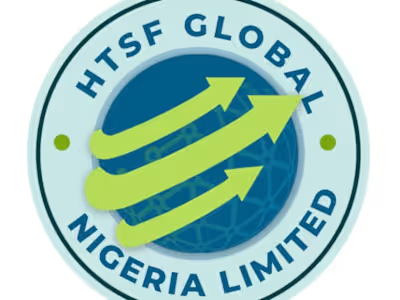Challenges, Barriers, with International Climate Financing
Like this project
Posted Jul 21, 2024
This project explores the challenges, barriers, and limitations faced in securing international climate finance for renewable energy projects in Nigeria.
Likes
0
Views
1
5.1 Financial Challenges
Nigeria, with its abundant renewable energy potential, particularly in solar, wind, and hydroelectric power, faces numerous challenges in harnessing this potential to achieve sustainable development goals. Despite significant international interest and investment, various financial, technical, regulatory, and socio-economic barriers impede the successful implementation of renewable energy projects. This chapter explores these challenges in detail, providing a comprehensive understanding of the obstacles that must be overcome to unlock Nigeria's renewable energy capabilities.
Funding Gaps
Nigeria's renewable energy projects often face significant funding gaps due to insufficient financial resources. These gaps delay project implementation and hinder progress toward clean energy goals. For instance, the "Solar Villages" initiative faced initial funding shortages, impacting its expansion into underserved regions, which are in dire need of renewable energy solutions (World Bank, 2018). According to the International Renewable Energy Agency (IRENA), securing adequate funding remains one of the major obstacles to scaling up renewable energy in developing countries like Nigeria (IRENA, 2019).
Disbursement Delays
Delays in fund disbursement are another major financial challenge. Bureaucratic processes and administrative hurdles often slow down the release of funds, making it difficult for project managers to adhere to timelines. This not only affects the progress of the projects but also undermines investor confidence, which is crucial for securing future investments (International Finance Corporation, 2020).
High Initial Capital Costs
Renewable energy projects often require high initial capital investments, which can be prohibitive for many stakeholders. The costs associated with purchasing and installing advanced technologies, such as solar panels and wind turbines, are substantial. These high upfront costs deter potential investors and slow down the adoption of renewable energy solutions (IRENA, 2018).
Limited Access to Financial Instruments
Access to diverse financial instruments, such as green bonds, grants, and low-interest loans, is crucial for the development of renewable energy projects. In Nigeria, the availability of such financial instruments is limited, making it challenging for developers to secure the necessary funding. Enhancing access to these instruments can significantly improve the financial viability of renewable energy projects (African Development Bank, 2020).
5.2 Technical Challenges
Nigeria's renewable energy sector also faces substantial technical challenges that impede the effective deployment and integration of clean energy technologies. These challenges must be addressed to ensure the successful implementation of renewable energy projects.
Technology Transfer
Adopting foreign technologies for Nigeria's unique context presents significant technical challenges. Successful implementation requires effective knowledge transfer and capacity building. For example, integrating solar microgrids into existing infrastructure necessitates specialized expertise that is often lacking locally. The need for continuous training and support is evident to ensure these technologies are effectively utilized and maintained (International Energy Agency, 2021).
Infrastructure Constraints
Nigeria's weak grid infrastructure is a significant barrier to the seamless integration of renewable energy projects. These projects depend on efficient transmission and distribution networks, but the outdated infrastructure limits their effectiveness. Upgrading the grid is essential to fully realize the benefits of renewable energy sources (African Development Bank, 2019).
Maintenance and Technical Support
Renewable energy systems require regular maintenance and technical support to function effectively. In Nigeria, there is a shortage of skilled technicians and engineers trained to maintain and repair renewable energy equipment. This lack of technical support can lead to frequent breakdowns and reduced efficiency of renewable energy installations (United Nations Environment Programme, 2020).
Local Manufacturing Capabilities
The absence of a robust local manufacturing sector for renewable energy components means that most equipment must be imported. This reliance on imports increases costs and can delay project timelines due to shipping and customs processes. Developing local manufacturing capabilities is crucial for reducing costs and ensuring timely project completion (IRENA, 2020).
Adaptation to Local Conditions
Renewable energy technologies developed in other parts of the world may not be fully adapted to Nigeria's specific environmental and climatic conditions. For example, solar panels designed for temperate climates might not perform optimally in Nigeria's hot and humid environment. Adapting technologies to local conditions is essential for maximizing their efficiency and lifespan (International Energy Agency, 2018).
5.3 Policy and Regulatory Complexities
Successfully deploying renewable energy projects in Nigeria requires navigating a complex landscape of policies and regulations. This section delves into the intricacies of the policy and regulatory environment that pose significant challenges to renewable energy development in the country.
### Bureaucratic Hurdles
Navigating the bureaucratic landscape to obtain permits, licenses, and approvals consumes valuable time and resources. Inconsistent processes across different government agencies create bottlenecks that delay projects. For instance, obtaining environmental impact assessments can be particularly cumbersome, further complicating project timelines (United Nations Development Programme, 2020).
### Policy Inconsistency
Frequent changes in energy policies disrupt project planning and execution. Investors need stable and predictable regulatory frameworks to mitigate risks. Aligning policies with long-term renewable energy goals is crucial to attract and retain investment. Consistency in policy-making will provide the necessary confidence for stakeholders to commit to large-scale renewable energy projects (BloombergNEF, 2021).
Regulatory Overlaps
Multiple regulatory bodies overseeing different aspects of renewable energy projects can lead to overlaps and conflicts, causing delays and confusion. For example, the roles of the Nigerian Electricity Regulatory Commission (NERC) and the Rural Electrification Agency (REA) sometimes intersect, creating uncertainties for project developers (African Development Bank, 2020). Clarifying and harmonizing the responsibilities of these agencies is crucial for smoother project implementation.
Lack of Incentives
Inadequate policy incentives for renewable energy investments pose another significant challenge. While some incentives exist, such as tax breaks and feed-in tariffs, they are often insufficient to attract large-scale investments. Strengthening and expanding these incentives can enhance the attractiveness of the renewable energy sector to both local and international investors (World Resources Institute, 2020).
5.4 Socio-Economic Considerations
Socio-economic factors play a crucial role in the success and sustainability of renewable energy projects. This section explores the social dynamics, community involvement, and broader economic impacts that influence renewable energy development in Nigeria.
Community Acceptance
Engaging local communities is pivotal for the sustainability of renewable energy projects. Community buy-in ensures smoother implementation and minimizes resistance. The Kainji Solar Park succeeded because it actively involved nearby communities in decision-making processes, demonstrating the importance of local engagement (African Development Bank, 2018). Additionally, a study by the International Institute for Environment and Development (IIED) highlighted that community participation is key to the success of renewable energy projects (IIED, 2017).
Social Impact
Balancing economic development with social and environmental well-being is a complex challenge. Renewable energy projects must address various community concerns, such as land use, job creation, and cultural preservation. Ensuring that these projects positively impact local communities will enhance their acceptance and success (World Resources Institute, 2021).
Job Creation and Local Employment
Renewable energy projects have the potential to create significant employment opportunities, both during the construction phase and in ongoing operations and maintenance. However, ensuring that these jobs are accessible to local communities requires targeted training and capacity-building initiatives. According to the International Labour Organization (ILO), renewable energy projects can stimulate local economies if there is a focus on developing local skills and capabilities (ILO, 2018).
Equity and Inclusion
Ensuring equitable access to the benefits of renewable energy is crucial for social acceptance. Projects must be designed to include marginalized and underserved communities, providing them with access to clean energy and the associated economic opportunities. This approach not only fosters social equity but also broadens the base of support for renewable energy initiatives (United Nations Development Programme, 2019).
Cultural and Social Dynamics
Understanding and respecting local cultural and social dynamics is essential for the success of renewable energy projects. Projects that fail to consider these aspects may face resistance and conflict. Engaging with local leaders, respecting traditional land uses, and integrating renewable energy solutions into the local cultural context can enhance community acceptance and support (International Institute for Environment and Development, 2020).
Conclusion
Addressing these challenges requires collaborative efforts from policymakers, investors, and local communities. By acknowledging and tackling the human and systemic barriers to renewable energy development, Nigeria can create a more resilient and sustainable energy future. Efforts must be directed towards ensuring financial viability, technical competence, regulatory stability, and socio-economic inclusiveness to achieve long-term success.
References
1. World Bank. "Nigeria: Solar Villages Project." Retrieved from [https://www.worldbank.org/en/results/2018/04/04/nigeria-solar-villages-project](https://www.worldbank.org/en/results/2018/04/04/nigeria-solar-villages-project).
2. African Development Bank. "Kainji Solar Park: Powering Nigeria's Future." Retrieved from [https://www.afdb.org/en/news-and-events/kainji-solar-park-powering-nigerias-future-19872](https://www.afdb.org/en/news-and-events/kainji-solar-park-powering-nigerias-future-19872).
3. International Renewable Energy Agency (IRENA). "Renewable Energy and Jobs Annual Review 2019." Retrieved from [https://www.irena.org/publications/2019/Jun/Renewable-Energy-and-Jobs-Annual-Review-2019](https://www.irena.org/publications/2019/Jun/Renewable-Energy-and-Jobs-Annual-Review-2019).
4. International Finance Corporation. "Unlocking Private Sector Investment in Emerging Markets." Retrieved from [https://www.ifc.org/wps/wcm/connect/publications_ext_content/ifc_external_publication_site/publications_listing_page/unlocking-private-sector-investment](https://www.ifc.org/wps/wcm/connect/publications_ext_content/ifc_external_publication_site/publications_listing_page/unlocking-private-sector-investment).
5. International Energy Agency. "Africa Energy Outlook 2021." Retrieved from [https://www.iea.org/reports/africa-energy-outlook-2021](https://www.iea.org/reports/africa-energy-outlook-2021).
6. African Development Bank. "Electricity Transmission and Distribution in Africa." Retrieved from [https://www.afdb.org/en/documents/document/electricity-transmission-and-distribution-in-africa-108951](https://www.afdb.org/en/documents/document/electricity-transmission-and-distribution-in-africa-108951).
7. United Nations Development Programme. "Environmental Impact Assessments and Development." Retrieved from [https://www.undp.org/publications/environmental-impact-assessments-and-development](https://www.undp.org/publications/environmental-impact-assessments-and-development).
8. BloombergNEF. "Nigeria's Energy Policy Review 2021." Retrieved from [https://about.bnef.com/blog/nigerias-energy-policy-review-2021/](https://about.bnef.com/blog/nigerias-energy-policy-review-2021/).
9. International Institute for Environment and Development (IIED). "Community Participation in Renewable Energy Projects." Retrieved from [https://www.iied.org/community-participation-renewable-energy-projects](https://www.iied.org/community-participation-renewable-energy-projects).
10. World Resources Institute. "Social and Environmental Impact of Renewable Energy." Retrieved from [https://www.wri.org/publication/social-and-environmental-impact-renewable-energy](https://www.wri.org/publication/social-and-environmental-impact-renewable-energy).




